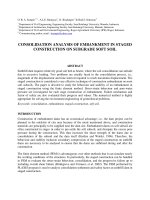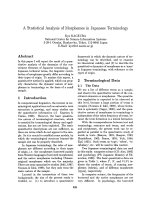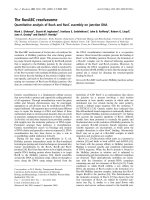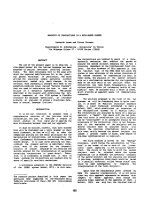CONSOLIDATION ANALYSIS OF EMBANKMENT IN STAGED CONSTRUCTION ON SUBGRADE SOFT SOIL
Bạn đang xem bản rút gọn của tài liệu. Xem và tải ngay bản đầy đủ của tài liệu tại đây (937.62 KB, 7 trang )
O. B. A. Sompie
1
, A.L.E. Rumayar
1
, J.I. Kindangen
2
& Budi I. Setiawan
3
1
Department of Civil Engineering, Engineering Faculty, Sam Ratulangi University, Manado, Indonesia
2
Department of Architecture, Engineering Faculty, Sam Ratulangi University, Manado, Indonesia
3
Department of Civil and Enviromental Engineering, Bogor Agricultural University (IPB), Bogor, Indonesia
Communicating author, email :
CONSOLIDATION ANALYSIS OF EMBANKMENT IN STAGED
CONSTRUCTION ON SUBGRADE SOFT SOIL
ABSTRACT
Earthfill dam requires relatively good soil bed as bearer, where the soil consolidation can subside
due to excessive loading. Two problems are usually faced in the consolidation process, i.e.,
magnitude of the displacement and time interval required to reach maximum displacement. The
staged construction is considered a very effective technique of construction embankment on most
soft subsoils. The paper is devoted to study the behaviour and stability of an embankment in
staged construction using the finite element method. Stress-strain behaviour and pore-water
pressure are investigated for each stage construction of embankment. Failure mechanism and
factor of safety are also evaluated their progress and values. The numerical method is highly
appropriate for solving the environment engineering of geotechnical problems.
Keywords: consolidation, embankment, staged construction, soft soil.
INTRODUCTION
Construction of embankment dams has an economical advantage; i.e., the dam project can be
planned in the outskirts of city area because of the merit mentioned above, and construction
materials are principally to be supplied near the dam site. Embankment dams on soft subsoil are
often constructed in stages in order to pre-settle the soft subsoil, and dissipate the excess pore
pressure during the construction. This thus increases the shear strength of the dams due to
consolidation of the subsoil and the dam itself (Hartlen and Wolski, 1996). Therefore, the
behaviour and stability inclusion secondary compression of the staged construction on earthfill
dams are necessary to be analysed to ensure that the dams are stabilised during and after the
construction.
The finite element method (FEM) is advantageous over other methods that it can simulate nearly
the working conditions of the structures. In particularly, the staged construction can be handled
in FEM to evaluate the stress-strain behaviour, consolidation, and the progressive failure up to
including overall shear failure (Brinkgreve and Vermeer, et al. 2002). The FEM performed by
PLAXIS program is used to analyse consolidation settlement and safety factor an earthfill dam in
staged construction.









